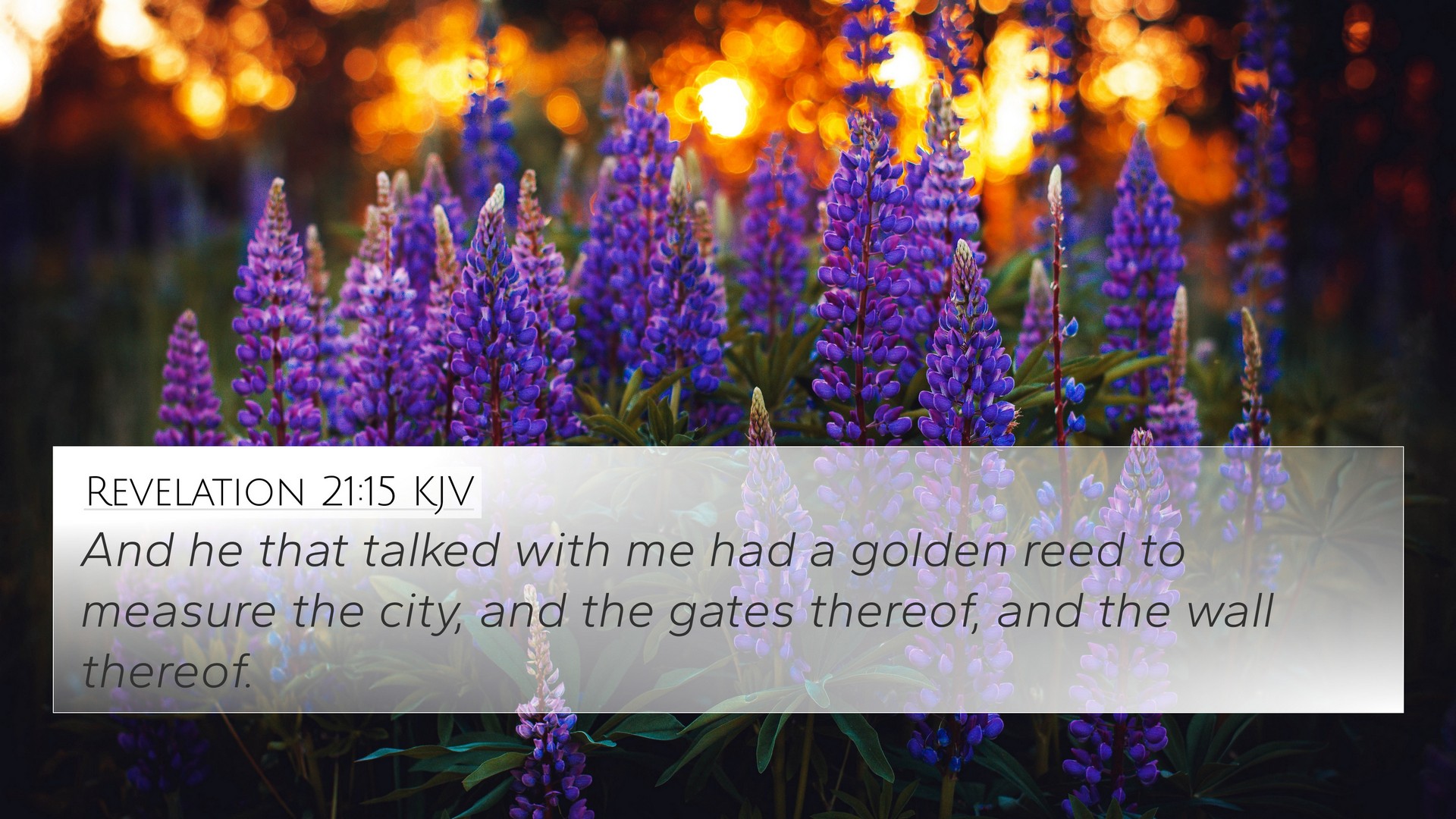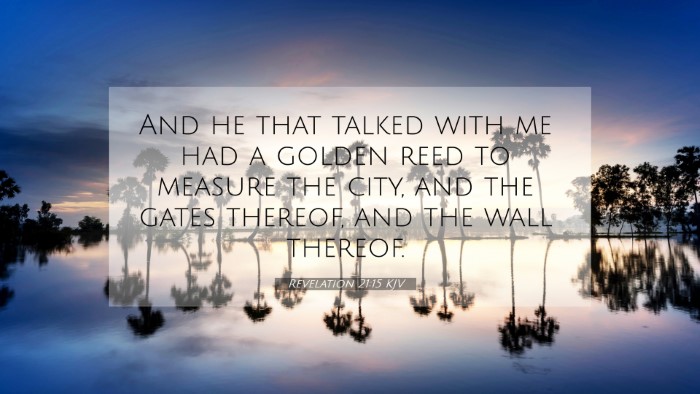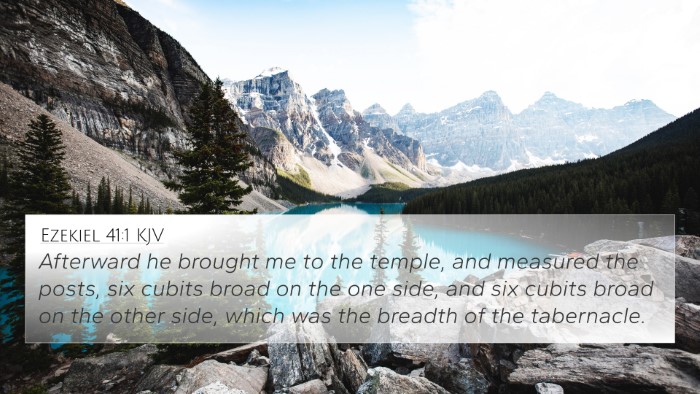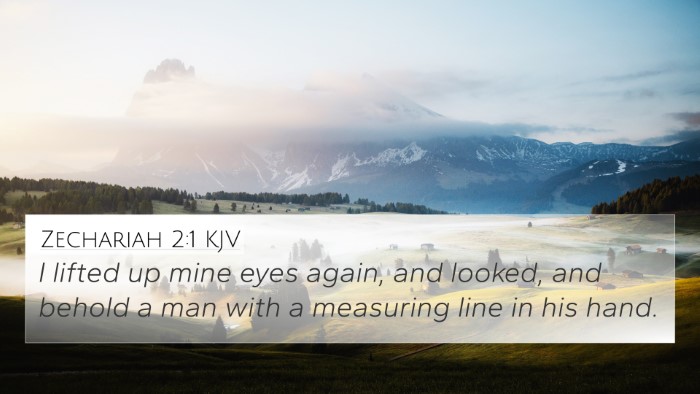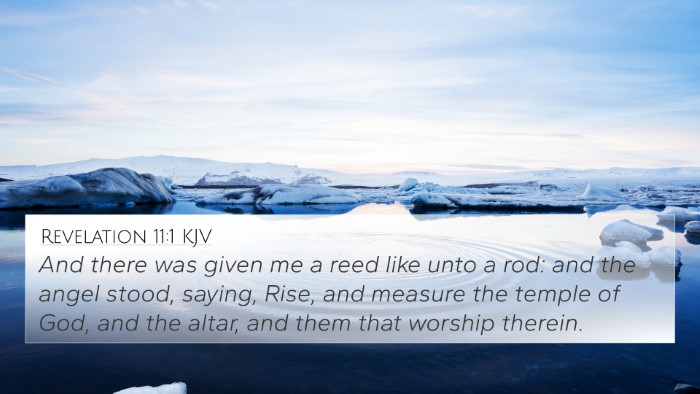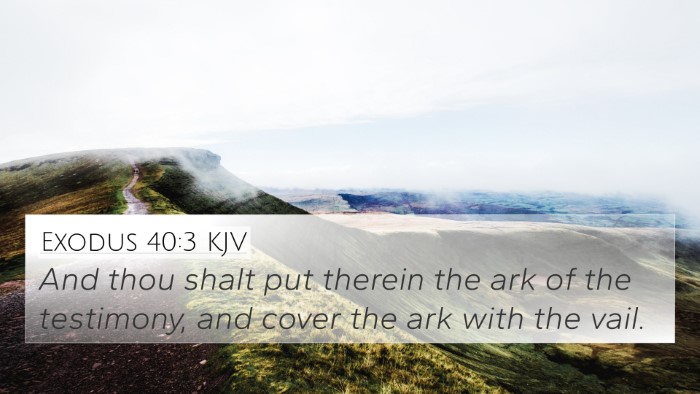Revelation 21:15 - Meaning and Interpretation
Revelation 21:15 states: "And he that talked with me had a golden reed to measure the city, and the gates thereof, and the wall thereof." This verse is pivotal in understanding the new Jerusalem described in the book of Revelation. Below is a detailed exploration of its meaning, connections, and insights gathered from various public domain commentaries.
Context of the Verse
The context of Revelation 21 involves the new heaven and new earth, where God dwells with His people. The measurement of the city signifies its perfection and divine order, giving us a glimpse of the eternal home prepared for believers.
Insights from Commentaries
- Matthew Henry's Commentary: Matthew Henry emphasizes that measuring is an act of ownership, indicating that the city belongs to God. The golden reed suggests the value and purity of the divine structure.
- Albert Barnes' Notes: Barnes reflects upon the symbolic nature of measuring, which infers the completeness and suitability of the city for divine habitation. Each aspect, including walls and gates, signifies security and divine protection.
- Adam Clarke's Commentary: Clarke discusses the implications of the wall and gates in representing the protection and access to God. The use of a golden reed signifies the city’s glory and perfection.
Thematic Connections
This verse connects to several important themes within the Bible:
- Divine Measurement: The act of measuring in scripture can denote God's authority. Similar instances are found in Ezekiel 40:3 and Zachariah 2:1-2.
- New Jerusalem: The description mirrors other biblical texts about the new Jerusalem, including Isaiah 65:17 and Hebrews 11:10, both emphasizing a future hope.
- God's Presence: The promise of God dwelling among His people is echoed in Revelation 21:3, highlighting the relational aspect of salvation and restoration.
Bible Cross-References
To enhance understanding, here are notable cross-references related to Revelation 21:15:
- Revelation 21:3: Correlates God's dwelling with humanity.
- Ezekiel 40:3: Shows a similar measurement of the temple.
- Isaiah 65:17: Describes a new creation and the joy it brings.
- Hebrews 11:10: Points toward the city with foundations whose builder is God.
- 2 Corinthians 5:1: Discusses the celestial house not made with hands.
- Matthew 5:14: Relates to believers as a city set on a hill.
- Galatians 4:26: References the heavenly Jerusalem as free.
Understanding Through Cross-References
Understanding Revelation 21:15 through these cross-references allows for deeper insights into God's plan for His people and the ultimate realization of His kingdom. The connections provide context that highlights themes of hope, restoration, and divine presence.
Conclusion
Revelation 21:15 serves as a powerful reminder of the future assurance believers have in Christ’s eventual reign. By employing various tools for Bible cross-referencing, one can further explore biblical themes and their interconnectedness, enriching one’s personal study and understanding of scriptures.
Tools for Bible Cross-Referencing
For effective study, consider using:
- Bible Concordance
- Bible Cross-Reference Guide
- Cross-Referencing Bible Study Methods
- Bible Reference Resources
- Comprehensive Bible Cross-Reference Materials
Further Study Suggestions
To delve deeper into the connections between this verse and others, future exploration might include:
- How to find cross-references in the Bible
- Identifying connections between Old and New Testament
- Links between the Prophets and Apostolic teachings
Cross-referencing Psalms with New Testament teachings
FAQs
- What verses are related to Revelation 21:15? The cross-references listed above provide strong connections for further study.
- How do Revelation 21:15 and Ezekiel 40:3 connect? Both involve measuring as a sign of God's authority and intention for His sacred spaces.
- What Bible verses support the themes in Revelation 21:15? Verses like Galatians 4:26 and Hebrews 11:10 reinforce the concept of the eternal city and God's promise to His people.
